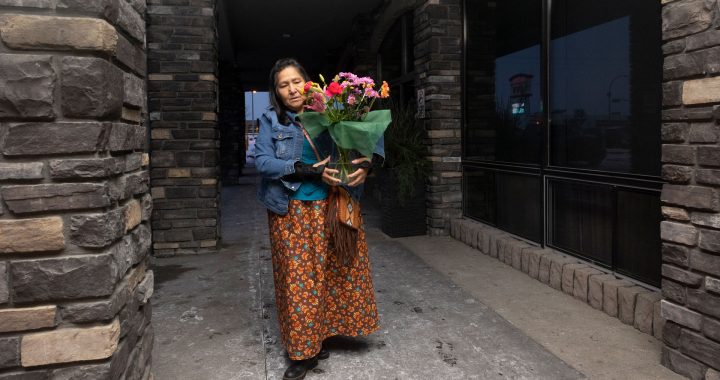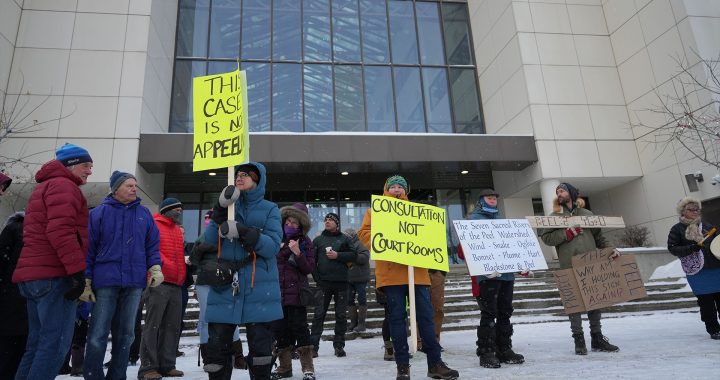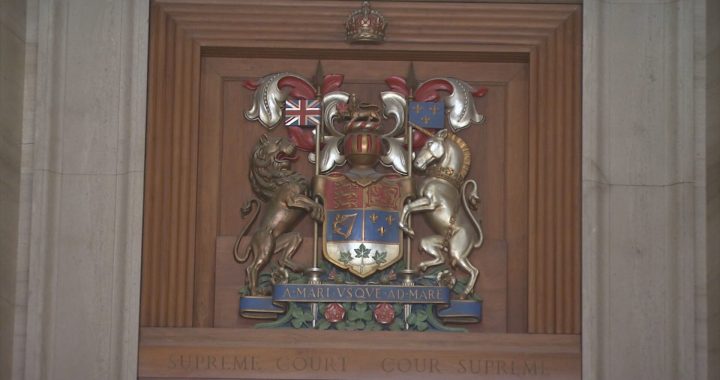Two weeks before Christmas in 2020, Celia Wright, a Ta’an Kwäch’än citizen, was pregnant, had eight children in her care, and was trying to get some rest in her Whitehorse-area home.
“I checked my doorbell camera to see who was knocking on my door so loudly and I saw a man with a black toque wearing all black looking very mean,” said Wright, in the APTN Investigates episode Scanned.
Wright, it turned out, had encountered agents operating under the Safer Communities and Neighbourhoods Act, or SCAN.
SCAN legislation, which is enacted in the Yukon and other jurisdictions, allows the government to deploy SCAN officers who surveil and, if deemed necessary, order the eviction of people from their homes in the interest of reducing criminality and/or increasing public safety in a location.

Christina Laing is Yukon’s director of Public Safety and Investigations, the department overseeing the Yukon program.
She explained how investigations can be prompted by complaints from neighbours who are permitted to remain anonymous in the process.
“We’ll talk to the complainant and ensure that it meets our specified uses under our mandate,” said Laing, “so that would include illegal drug trafficking, illegal firearms trafficking, organized crime. It would include prostitution activities that are related to illegal activities. It also includes bootlegging and it includes child exploitation.”
SCAN has its critics, including Yukon’s NDP leader, MLA Kate White.
“SCAN does not solve crime – it moves it,” said White, who has pushed the Liberal territorial government to conduct a review, which is not expected to be finished until 2027.
White would like to see more supports in place for the people who come up against SCAN.
“We have to have more access to supervised consumption, safe supply, and then the ability to go towards treatment if that’s what people want,” said White.
And on the front line of Whitehorse’s homelessness problem, Kate Mechan of Safe at Home Society has a degree of unease about SCAN.
“There are challenges with any sort of legislation that disproportionately impacts vulnerable folks – Indigenous folks – that has the potential to be inherently discriminatory, said Mechan.
It’s significant that about a month prior to SCAN officers turning up on the property Wright rented with her partner, the RCMP had visited as well, conducting a raid they publicized as the result of Project MUSKRAT.
Project MUSKRAT saw five Whitehorse residents including Wright and her partner charged with offenses related to an alleged cocaine trafficking and money laundering operation.
More than four years later, the charges against Wright and her partner have not been to trial and therefore remain unproven.
One of the conditions at the arraignment of Chartrand and Wright was that they would remain at the address they were living at when raided by the RCMP.
But then, when SCAN visited, the eviction order said they had to be out in just five days.
“How can you put a family in a position to have five days to get out,” said Wright. “That’s crazy. Giving anyone five days to pack every single bit of their entire life in the house that they live in is crazy.”

For Wright, the five-day eviction order seemed unreasonable and potentially illegal so she contacted lawyer Vincent Larochelle – who agreed with her.
With Larochelle’s help, Wright launched a constitutional challenge against the SCAN legislation in the Yukon Supreme Court.
Larochelle was unfamiliar with SCAN but quickly developed an opinion about it.
“It was immediately apparent to me, immediately obvious that the law that allowed such action, such state conduct, was unconstitutional,” said Larochelle.
The legal challenge authored by LaRochelle hinged on Section 7 of the Canadian Charter of Rights and Freedoms.
His claim is that evictions with just five days notice allowed under the SCAN law are counter to the Section 7 guarantee of “security of the person.”
The way Larochelle sees it, the effect of SCAN on Celia Wright’s life runs counter to that right.
“I think the simplest, perhaps short and snappy characterization is that it destroyed her home and her family’s home,” says Larochelle.
In a September 2024 ruling, Chief Justice S.M. Duncan of the Yukon Supreme Court agreed in part with Larochelle’s arguments, zeroing in on the five-day eviction deadline.
“Evicting someone from their home in five days without effective recourse, for the purpose of restoring the peaceful enjoyment of property of others in the neighbourhood, is grossly disproportionate,” Duncan writes.
Read More:
Fate of Yukon’s safe communities law in the hands of judge
The Yukon Supreme Court ruling further states that the “public benefits” of the section of SCAN legislation that allows for five-day evictions “does not outweigh the impact on individual rights.”
With the ruling, the provision for five-day evictions in the Yukon SCAN legislation was struck down.
Wright is now hopeful that others will take note of her victory and be emboldened to push back against SCAN.
“I would hope that this movement alone would wake up some other lawyers and make them see like, maybe this is what we should be doing too,” said Wright.
“People don’t deserve to be homeless,” says Wright. “People don’t deserve to have their world ripped up like that. People don’t deserve five days to pack. People deserve time and grace and love and encouragement.”
And her lawyer Vincent Larochelle sees potential for people who have been evicted under the five-day eviction provision to sue.
“If someone has been evicted from their home based on a SCAN notification here in the Yukon, they may certainly have a claim against the Yukon given that that conduct was unconstitutional,” said Larochelle.
Here are some selected figures collected by APTN Investigates about how SCAN operates in these places.
In the Yukon in 2023, SCAN investigated 139 complaints, resulting in eight evictions, and 26 warnings.
In Manitoba, in the 2023-24 fiscal, SCAN had 332 complaints resulting in 101 shutdowns of properties involved in “offence operations.”
In New Brunswick, in the 2023-24 fiscal, investigators looked at 170 complaints, resulting in 25 properties vacated, and 1 community safety order [which means a property is ordered closed for a period of time].
In Nova Scotia in 2023, SCAN investigated 74 cases, resulting in no community safety orders, but in 13 cases individuals living at a location moved elsewhere [these are not evictions, according to Nova Scotia].
In Saskatchewan in 2023, SCAN investigated 412 complaints, resulting in 64 warning letters, 42 demand to vacate notices, and four community safety orders.
In Alberta since 2008, SCAN has investigated more than 9,000 properties, resulting in 126 community safety orders. In the last five months, Alberta says they have closed seven properties in Lethbridge, Calgary, Spruce Grove and Medicine Hat.












